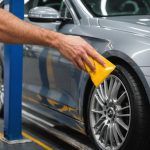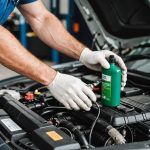Increasing fuel efficiency in your vehicle is not only beneficial for your wallet but also contributes positively to the environment. In today’s world, where fuel prices constantly fluctuate, being able to drive your car with an efficient mindset can help reduce costs and improve mileage. This article will explore several strategies that will allow you to optimize your car’s fuel economy while maintaining its performance. You will learn actionable tips that can lead to substantial changes in your gas consumption without compromising on speed or driving enjoyment.
Regular Maintenance for Optimal Engine Performance
One of the most straightforward ways to enhance your car’s fuel efficiency is through regular maintenance. Your vehicle’s engine is a complex system that requires attention to detail. Neglecting routine checks can lead to reduced performance and increased consumption of fuel.
Additional reading : How can you tell if your car needs a professional inspection or if it’s a simple fix?
Changing your oil regularly is essential. Oil lubricates the engine, reduces friction, and helps to improve performance. If the oil is old or contaminated, it can cause the engine to work harder, thereby using more fuel. Check your manufacturer’s guidelines for how often you should change your oil.
Air filters are another critical component. A clean air filter allows the engine to breathe more efficiently, ensuring the right mixture of air and fuel. If your air filter is clogged, it can lead to poor engine performance and increased fuel consumption. It’s advisable to replace the air filter every 15,000 to 30,000 miles, or as recommended in your owner’s manual.
Topic to read : How can you identify and fix common electrical issues in your vehicle?
Additionally, spark plugs need to be in good shape. Worn or dirty spark plugs can cause misfires, which not only affects performance but also leads to wasted fuel. Inspect and replace them if necessary. Proper maintenance of your vehicle’s systems directly correlates with improved fuel economy and vehicle performance.
Tire Maintenance and Its Impact on Fuel Efficiency
Tires play a significant role in your vehicle’s fuel economy. Properly inflated tires can lead to improved mileage and lower gas consumption. When tires are under-inflated, they create more rolling resistance, which means your engine has to work harder to maintain speed. This increased workload results in higher fuel usage.
You should check your tire pressure at least once a month. The recommended tire pressure can usually be found on a sticker inside the driver’s door or in the owner’s manual. Maintaining the correct tire pressure not only improves fuel efficiency but also enhances handling and extends the life of the tires.
In addition to air pressure, tread depth is crucial. Worn tires can affect traction and handling, meaning the engine will again need to exert more effort to perform effectively. Regularly inspecting your tires for wear and replacing them when necessary will help ensure that your vehicle remains efficient on the road.
Furthermore, consider rotating your tires regularly to promote even wear. This practice can also extend the lifespan of your tires and contribute to consistent fuel performance. Investing time in tire maintenance is a small step that can lead to significant improvements in your car’s overall efficiency.
Driving Habits that Enhance Fuel Economy
Your driving style greatly influences your vehicle’s fuel efficiency. By adopting more mindful driving habits, you can substantially reduce fuel consumption without sacrificing performance.
Aggressive driving, which includes rapid acceleration and hard braking, can significantly decrease your mileage. Instead, practice smooth acceleration and deceleration. Gradually increasing speed and gently pressing the brakes will allow your vehicle to operate more efficiently. According to studies, maintaining a steady speed can improve your gas mileage by up to 30% on the highway.
Utilizing cruise control on long trips can also help maintain a constant speed, further enhancing fuel economy. However, be cautious when using cruise control on hilly terrain, as it may cause unnecessary acceleration.
Another great tip is to limit idling. When your car is stationary and the engine is running, it consumes fuel without moving. Turn off the engine if you anticipate being stopped for more than a minute or two. This simple habit can lead to significant fuel savings over time.
Finally, consider reducing your load. Excess weight in the trunk can cause your engine to work harder, which can worsen your fuel efficiency. Remove unnecessary items from your vehicle to lighten the load and improve gas consumption.
Fuel Choices and Their Impact on Efficiency
The type of fuel you choose to fill your vehicle can have a direct impact on your car’s fuel efficiency. Different fuels have varying qualities and characteristics that can affect performance.
For instance, using high-quality fuel with the appropriate octane rating for your vehicle is crucial. Consult your owner’s manual to know the recommended fuel type for your car. Higher octane fuel can prevent knocking in high-performance engines, but if your car is designed to run on regular fuel, using premium fuel may not yield any benefits in terms of fuel economy.
Furthermore, consider using fuel additives. Some products can help clean your engine, improve combustion, and enhance overall performance. However, always ensure that the additives you choose are compatible with your vehicle’s specifications, as incorrect use can lead to damage and void warranties.
Also, keep in mind that driving at optimal speeds can influence your fuel economy. Maintaining a speed of around 55-65 mph tends to be the sweet spot for many vehicles. Beyond this speed, aerodynamic drag increases significantly, leading to higher fuel consumption. Therefore, by being mindful of your driving speed and fuel choices, you can achieve better mileage.
Improving your car’s fuel efficiency doesn’t have to mean sacrificing performance. By implementing regular maintenance, being mindful of tire health, adapting your driving habits, and making informed fuel choices, you can achieve a balance that benefits both your wallet and your vehicle’s longevity. Small changes in how you care for and drive your vehicle can lead to significant enhancements in gas consumption and overall engine performance. As you incorporate these strategies into your routine, you will likely notice an improvement in your vehicle’s efficiency, allowing you to enjoy more miles on the road.











